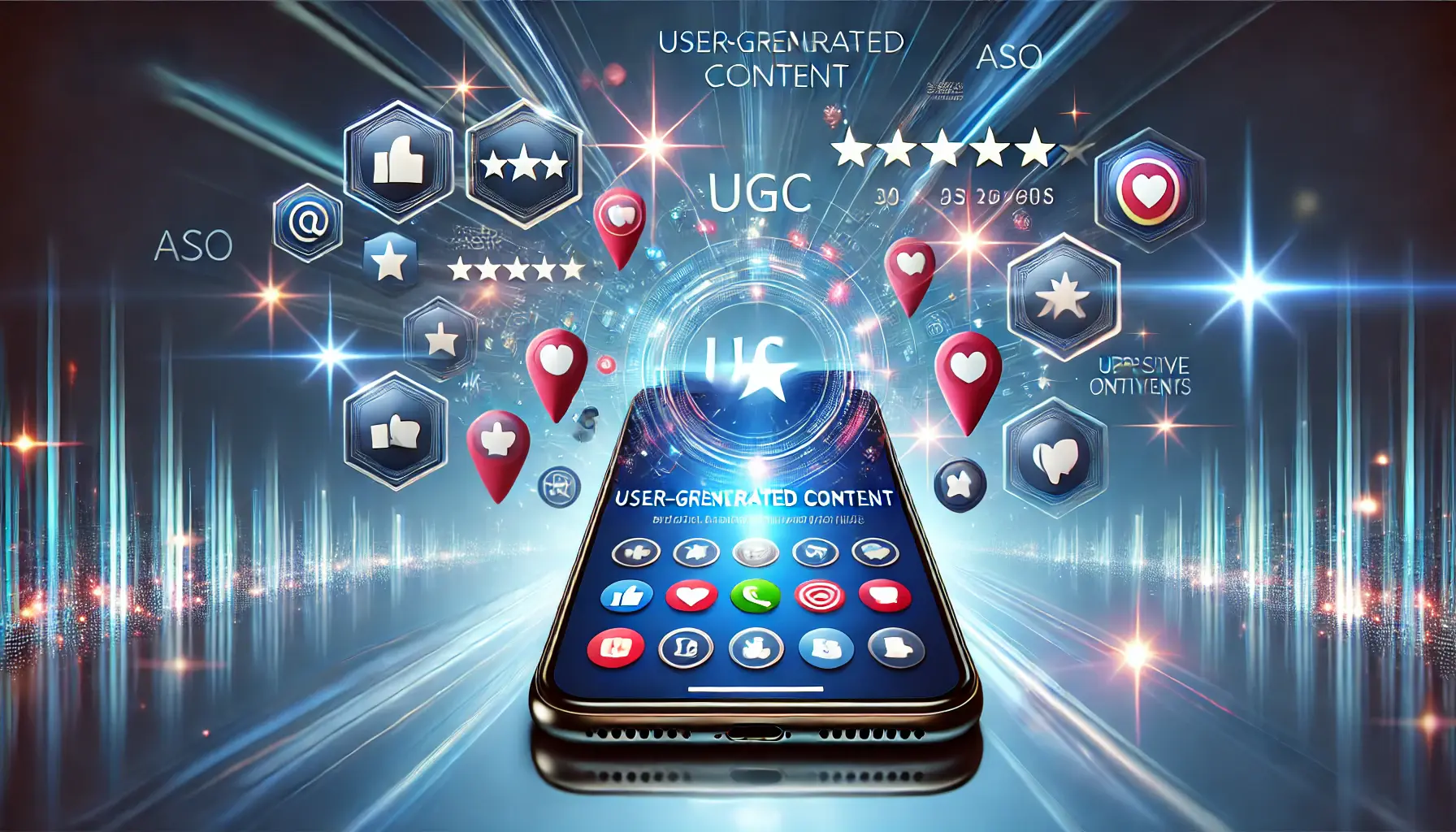Standing out in today’s competitive app marketplace requires much more than a sleek design and robust functionality.
One of the best ways to improve visibility and credibility for your app is through the implementation of user-generated content into your ASOApp Store Optimization (ASO) refers to the process of improving an app's visibility and ranking in app stores. previews.
With real user experiences included in your ASO preview videos, you build trust with potential users and increase the appeal and visibility of your app.
- Understanding User-Generated Content in ASO
- Types of User-Generated Content for ASO Previews
- Integrating User-Generated Content into App Store Preview Videos
- Encouraging Users to Create Content for ASO
- Measuring the Impact of User-Generated Content on ASO Performance
- Maximizing ASO Performance with User-Generated Content
- Frequently Asked Questions about User-Generated Content in ASO Previews
Understanding User-Generated Content in ASO

A dynamic visualization of user-generated content (UGC) showcasing app reviews, ratings, and user interactions.
Defining User-Generated Content (UGC)
Any form of content—reviews, testimonialsStatements from users that describe their experience with an app, often used to build trust., images, videos, and social media posts—that is created and shared by users of your app refers to user-generated content.
This is the most authentic and powerful content that influences others’ minds and motivates them to download the app.

An engaging visualization of how user-generated content (UGC) enhances app store optimization (ASO) through ratings, reviews, and user interactions.
The Role of UGC in App Store Optimization
Incorporating UGCUser-Generated Content (UGC) includes any content created by users rather than brands, such as reviews and social media posts. into your ASO strategy can massively improve your app’s credibility and visibility.
After all, potential users are more likely to trust their peers than advertisements, and user-generated content will be a strong influencer in download decisions.

A visualization of how user-generated content (UGC) enhances app credibility, trust, and conversion rates in ASO strategies.
Benefits of Including UGC in ASO Strategies
- Authenticity: UGC provides extremely authentic reviews of the user experience of your app and helps build trust among potential users.
- Better Engagement: Featuring UGC motivates existing users to share experiences, creating a sense of community.
- Improved Conversion Rates: Real users testifying to your application may convince indecisive users to download it.
Incorporating user-generated content (UGC) in ASO provides an authentic touch that resonates with potential users, making them more likely to trust your app.

A dynamic visualization showcasing various types of user-generated content (UGC) used in ASO previews to enhance credibility and user engagement.
Types of User-Generated Content for ASO Previews
Incorporating various forms of user-generated content (UGC) into your ASO previews can significantly enhance your app’s appeal and credibility.
By showcasing authentic user experiences, potential users gain a clearer understanding of your app’s value, leading to increased trust and higher conversion ratesThe percentage of users who take a desired action, such as downloading an app after viewing a preview..
One impactful type of UGC is user reviews and ratings.
These provide firsthand accounts of user satisfaction and app performance, serving as social proofA psychological phenomenon where people assume the actions of others reflect the correct behavior, often influencing decisions. that can influence download decisions.
Highlighting positive reviews in your ASO previews can reassure potential users of your app’s quality and reliability.

A visualization of user-generated screenshots and videos showcasing real user interactions in ASO strategies.
User-Created Screenshots and Videos
Another valuable form of UGC includes user-created screenshots and videos.
These visuals offer genuine insights into how users interact with your app, showcasing real-life applications and benefits.
Incorporating such content into your ASO preview videos not only adds authenticity but also allows potential users to envision themselves using the app, thereby increasing engagementThe level of interaction users have with an app, including usage frequency and feature interaction. and interest.

A visualization of how social media mentions and shares contribute to app visibility and credibility in ASO strategies.
Social Media Mentions and Shares
Social media mentions and shares also play a crucial role in enhancing your app’s visibility.
When users share their positive experiences on platforms like Instagram, Twitter, or Facebook, it amplifies your app’s reach and serves as a testament to its value.
Featuring these social media testimonials in your ASO previews can leverage the power of peer recommendations, further boosting your app’s credibility and appeal.
By strategically including these types of user-generated content in your ASO previews, you can deliver a more intriguing and trustworthy representation of your app, ultimately driving higher download rates and increased user engagement.
Leveraging different types of UGC, such as user reviews, screenshots, and social media mentions, strengthens your ASO strategy and boosts conversion rates.

A dynamic visualization of how user-generated content (UGC) is integrated into app store preview videos to enhance authenticity and user engagement.
Integrating User-Generated Content into App Store Preview Videos
Incorporating user-generated content (UGC) into your ASO preview videos can significantly enhance authenticity and user trust.
However, it’s essential to navigate this process carefully to ensure compliance with platform guidelines and to present your app in the best possible light.
When selecting UGC for your preview videos, prioritize content that accurately reflects your app’s core features and user experience.
This might include screen recordings from users that showcase unique functionalities or creative uses of your app.
Ensure that the chosen content aligns with the message you wish to convey and resonates with your target audience.

A dynamic visualization of the process of editing user-generated content (UGC) into cohesive and professional app store preview videos.
Best Practices for Editing UGC into Preview Videos
Editing is an important aspect of integrating UGC into your ASO preview videos.
Create a cohesive storyline to demonstrate how real users can benefit from your app.
Keep the following in mind:
- Clarity: The UGC must be visually and audibly clear to avoid misrepresenting your app.
- Consistency: Merge UGC smoothly with your original content to maintain a consistent look and feel throughout the video.
- Highlight Key Features: Use annotations or callouts to draw attention to specific features demonstrated within the UGC.

A visualization of the importance of adhering to app store guidelines when using user-generated content (UGC) in app preview videos.
Ensuring Compliance with App Store Guidelines
When implementing UGC, it’s paramount to follow the App Store Review Guidelines.
Apple requires that all app previews must only present content featured within the app itself.
It prohibits displaying users interacting with a device, such as over-the-shoulder shots or fingers tapping on the screen.
Additionally, all content must be suitable for all audiences, avoiding any objectionable material.
By thoughtfully incorporating user-generated content into your ASO preview videos, you can create more engaging and trustworthy visuals, making your app more relatable and appealing to potential users.
Ensuring that user-generated content aligns with platform guidelines is crucial for maximizing the impact of ASO preview videos.

A dynamic visualization of how incentivizing users can encourage content creation for app store optimization.
Encouraging Users to Create Content for ASO
Fostering user-generated content (UGC) is pivotal for enhancing your app’s App Store Optimization (ASO) strategy.
By motivating users to share their experiences, you not only enrich your app’s content but also build a community of engaged users.
Let’s explore effective strategies to encourage users to create content that boosts your ASO previews.
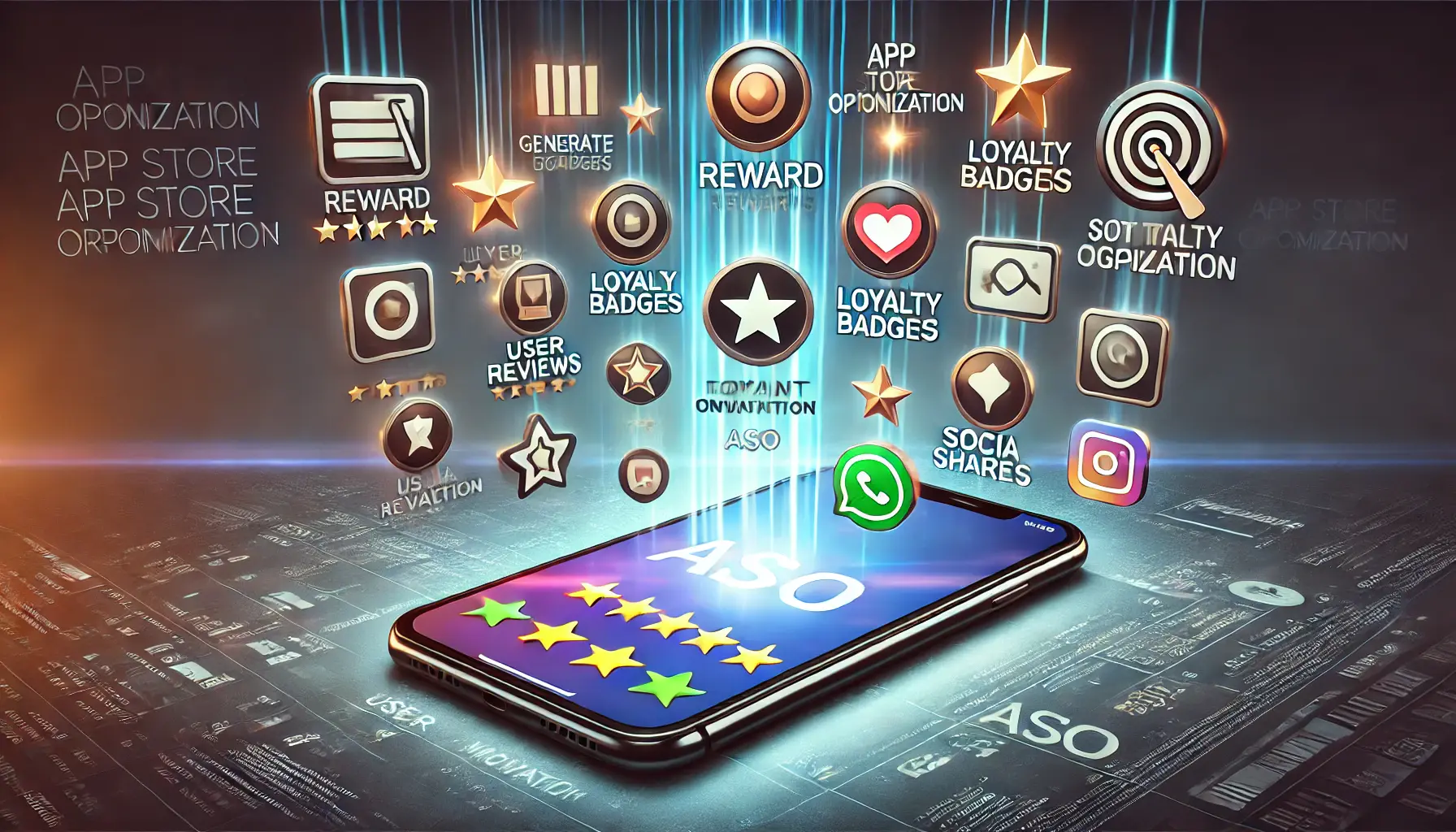
A dynamic visualization of how strategies like rewards and contests can motivate users to generate content for ASO.
Strategies to Motivate Users to Generate Content
One effective approach is to host review campaigns.
Incentivize customers to leave reviews with discounts, coupons, or entries into a giveaway.
This will not only increase the volume of UGC but also improve user engagement with your app.
Another strategy is to make use of social media platforms.
Encourage users to share their experiences on platforms like Instagram, Twitter, or Facebook by creating branded hashtags or featuring user posts on your official channels.
This not only creates UGC but also promotes your app across several platforms, increasing its visibility and credibility.
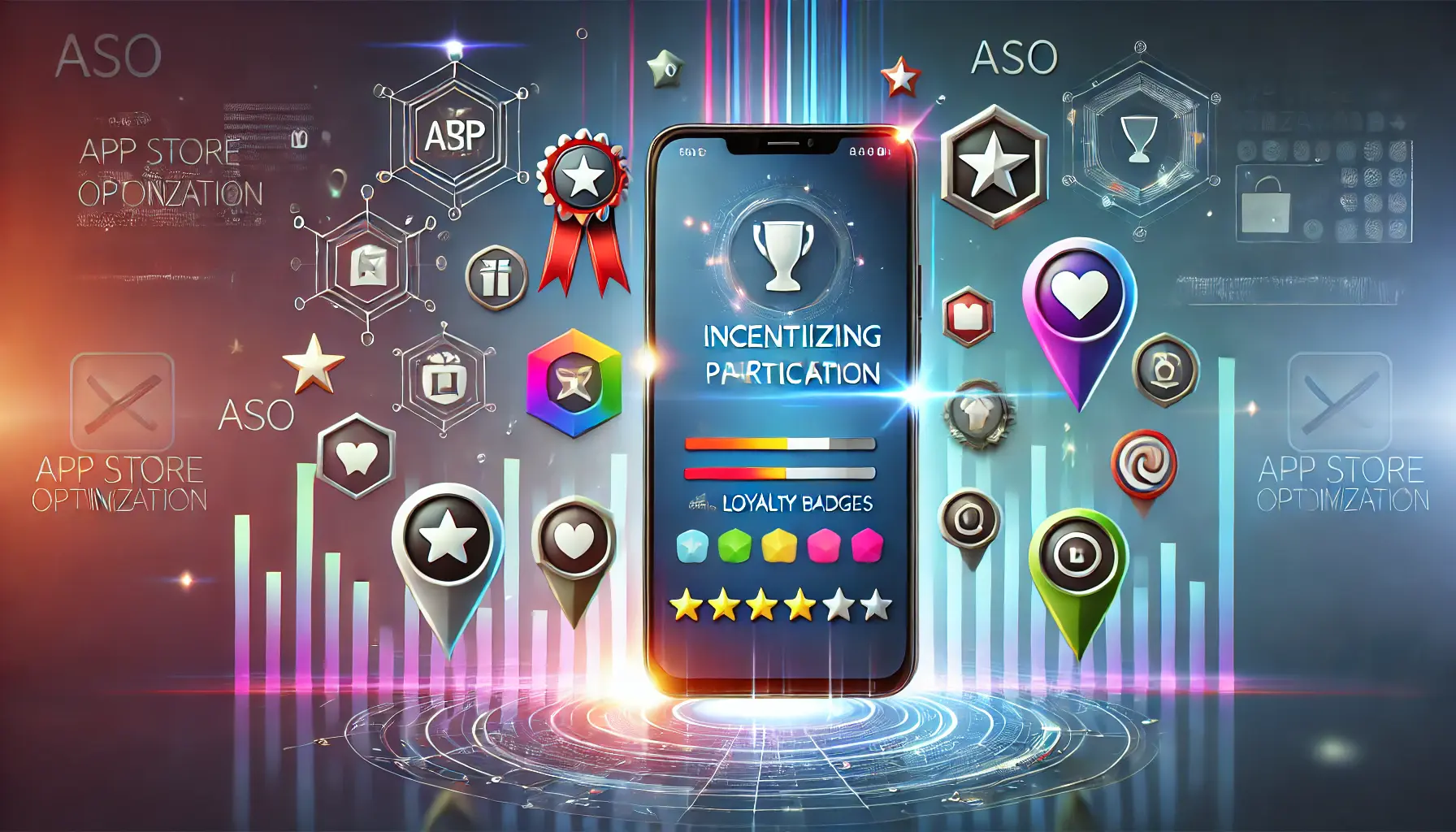
A dynamic visualization of how incentives like rewards and loyalty programs motivate users to participate in content creation for ASO.
Incentivizing User Participation
Incentives go a long way in ensuring that users create more content.
Consider implementing the following methods to encourage participation:
- Loyalty Rewards: Offer in-app rewards, discounts, or exclusive perks for users who share their experiences.
- Early Access: Grant early access to new features for users who contribute valuable content.
- Targeted Promotions: Provide personalized promotions to users who engage actively with your app.
Contests are another effective way to incentivize UGC.
By leveraging a bit of healthy competition, a contest can energize customers and encourage user-generated content.
You can tailor these contests based on your business type and what your customers respond to best.
Building a Community Around Your App
Creating a community within your app can be one of the best ways to encourage users to generate content.
Provide features that allow them to interact, share experiences, and provide feedback.
When users feel a sense of belonging, they are more likely to create content that can be integrated into your ASO strategy.
By implementing these strategies, you can effectively incentivize users to create valuable content, which will improve your ASO performance and help you build brand-loyal users.
Providing incentives like loyalty rewards, social media features, and contests can significantly boost user-generated content production.

A dynamic visualization of how user-generated content (UGC) affects key app store optimization (ASO) performance metrics such as rankings, downloads, and user engagement.
Measuring the Impact of User-Generated Content on ASO Performance
Understanding the effectiveness of user-generated content (UGC) in your App Store Optimization (ASO) strategy is crucial for continuous improvement.
By analyzing specific metricsQuantifiable measures used to track and assess the success of an ASO strategy., you can gauge how UGC influences your app’s visibility, user engagement, and overall success.

A dynamic visualization of the key metrics used to track the effectiveness of user-generated content (UGC) in app store optimization (ASO).
Key Metrics to Track UGC Effectiveness
To assess the impact of UGC, monitor the following key performance indicators (KPIs):
- App Store Rankings: Observe the movement of your app in ranking for targeted keywords and categories. Improvement might signify that UGC is enhancing your app’s visibility in app stores.
- Download Rates: Compare downloads before and after implementing UGC-related strategies to determine their effectiveness.
- Conversion Rates: Analyze the percentage of users who install the app after viewing your ASO previews, as UGC can influence their decision-making process.

A dynamic visualization of how user engagement and conversion rates are analyzed to optimize app store performance.
Analyzing User Engagement and Conversion Rates
UGC often leads to increased user engagement, as potential users find real-life experiences more relatable.
To measure this:
- User Reviews and Ratings: Observe volume and sentiment. An increase in positive reviews may indicate successful UGC efforts.
- In-App Engagement: Check metrics like session length and frequency to see if UGC leads to a more active user base.
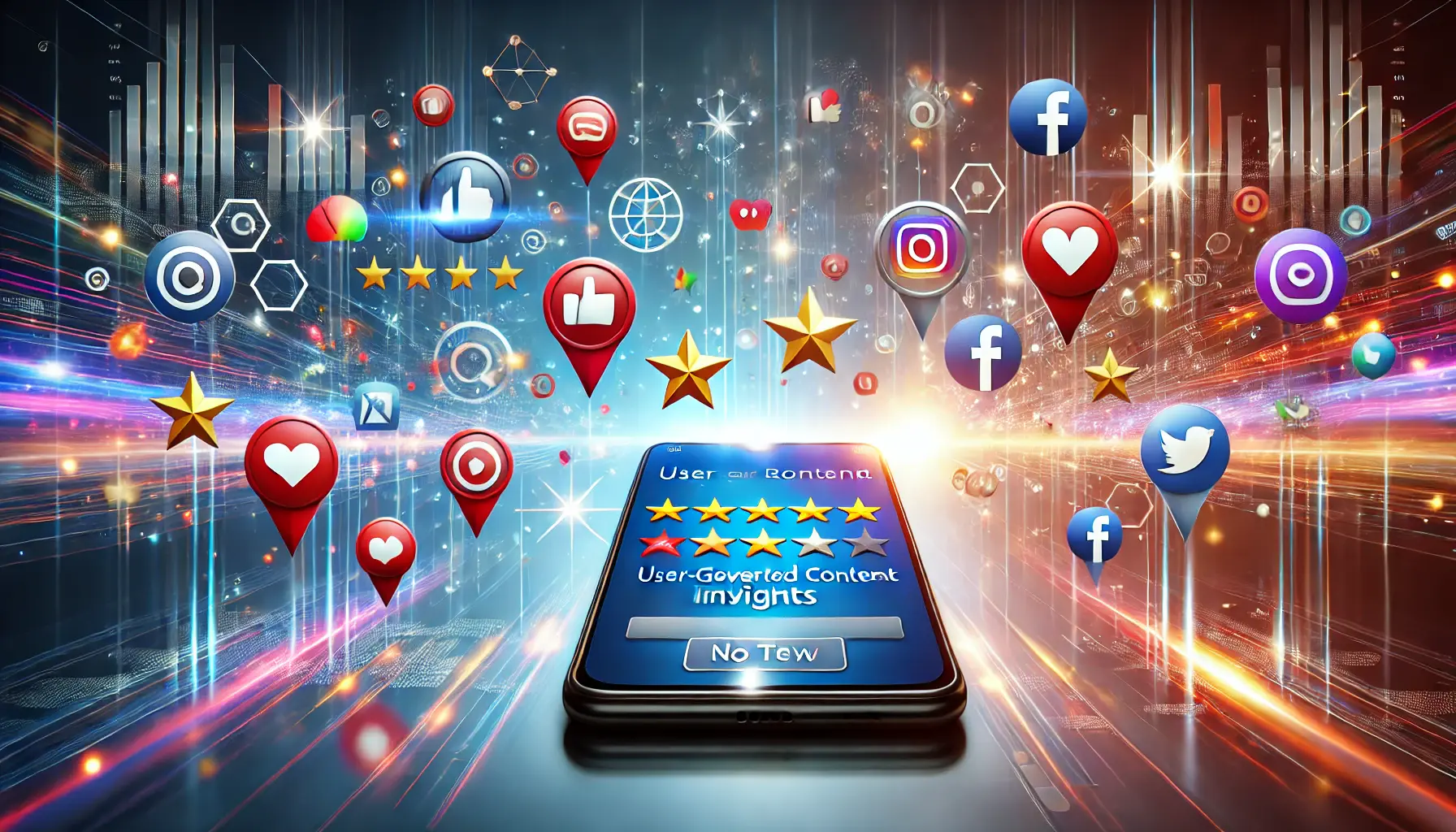
A dynamic visualization of how user-generated content (UGC) insights influence app store optimization (ASO) strategy and performance.
How UGC Insights Impact the ASO Strategy
Regularly reviewing UGC-related metrics enables you to refine your ASO strategy.
For example, if certain types of UGC correlate with higher conversion rates, consider making similar content more prominent.
Moreover, addressing constructive criticism found in user reviews may lead to app improvements, further boosting user satisfaction and ASO performance.
By systematically measuring and analyzing the impact of user-generated content, you can make informed decisions that will enhance the visibility and appeal of your app in the competitive app marketplace.
Tracking key metrics such as app store rankings, conversion rates, and user engagement can help refine and optimize your ASO strategy.

A dynamic visualization of how user-generated content (UGC) enhances app store optimization (ASO) performance, driving visibility and engagement.
Maximizing ASO Performance with User-Generated Content
Leveraging user-generated content (UGC) in ASO previews is a game-changer for app developers aiming to increase visibility and conversions.
By incorporating authentic user experiences into ASO preview videos, developers can build trust, drive engagement, and ultimately enhance their app’s success in a competitive marketplace.
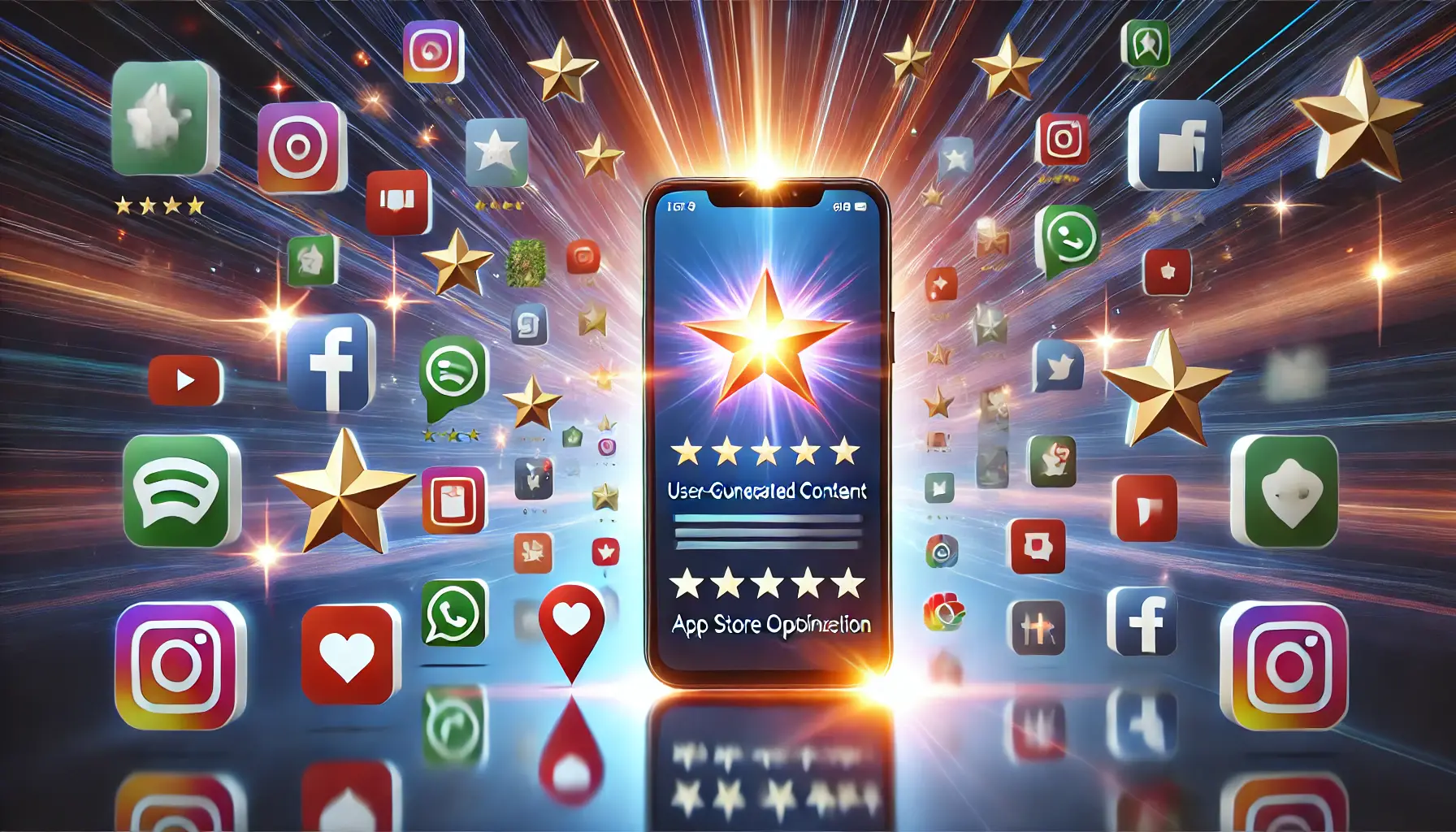
A dynamic visualization of how user-generated content (UGC) powers app store optimization (ASO), driving visibility, trust, and engagement.
The Power of User-Generated Content in ASO
UGC plays a crucial role in influencing potential users by providing them with real, unbiased insights into an app’s functionality and usability.
Unlike traditional marketing materials, UGC fosters authenticity, making it easier for users to connect with an app on a personal level.
Whether through reviews, social media shares, or user-created videos, this type of content significantly impacts App Store rankings and conversion rates.
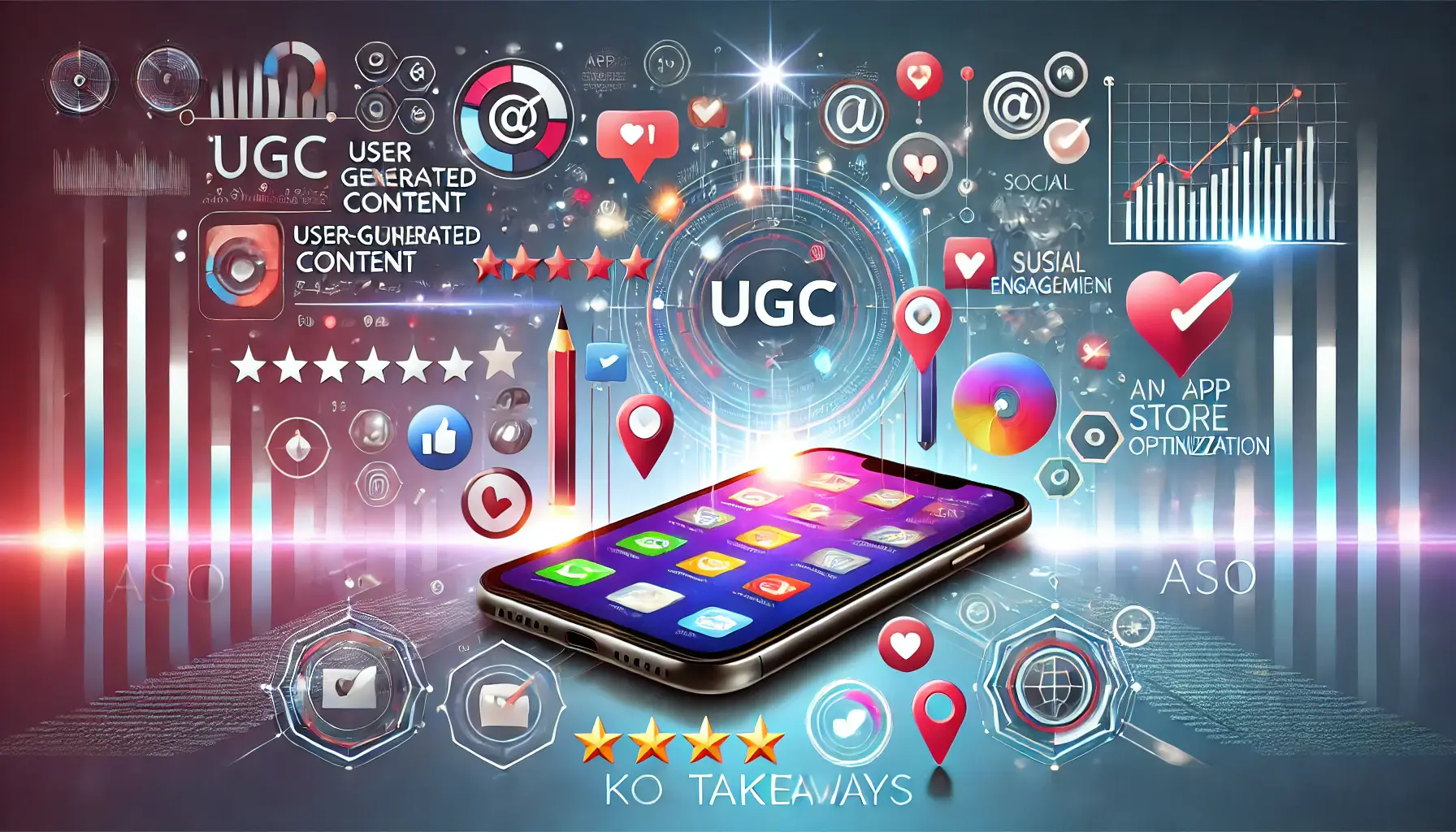
A dynamic visualization of the key takeaways for successfully implementing user-generated content (UGC) in app store optimization (ASO).
Key Takeaways for Implementing UGC in ASO
- Diversify Content: Incorporate user reviews, ratings, screenshots, and videos into your ASO previews to maximize engagement.
- Encourage Participation: Motivate users to generate content by offering incentives, running contests, and fostering a strong community.
- Maintain Compliance: Ensure all UGC featured in ASO preview videos aligns with App Store guidelines to avoid rejection.
- Monitor and Optimize: Regularly analyze key performance indicators (KPIs) such as download rates, engagement levels, and conversion rates to refine your strategy.

A dynamic visualization of the continuous process of app store optimization (ASO) and strategic improvements for success.
Looking Ahead: Continuous Optimization for ASO Success
ASO is an ongoing process that requires constant adaptation and improvement.
By continuously analyzing the impact of UGC, refining content strategies, and staying updated on App Store trends, developers can maintain a competitive edge.
Leveraging user-generated content effectively ensures that your app remains visible, relevant, and engaging to new users.
As competition in the app marketplace intensifies, integrating UGC into ASO previews is no longer optional—it is a necessity.
Apps that prioritize authentic user experiences will continue to thrive, securing higher rankings, better engagement, and sustained long-term growth.
Continuous optimization and adaptation of UGC in ASO strategies ensure long-term success in a competitive app marketplace.

A dynamic visualization of frequently asked questions about user-generated content (UGC) and its role in app store optimization (ASO) previews.
Boost your mobile app's success with our guaranteed App Store Optimization (ASO) service. Leave it to the experts!
Frequently Asked Questions about User-Generated Content in ASO Previews
User-generated content (UGC) in ASO involves reviews, testimonials, images, and videos made by app users.
This content builds trust, enhances authenticity, and influences user decisions.
UGC boosts ASO by providing real user experiences, increasing app credibility, and persuading potential users to download an application.
Effective UGC for ASO previews includes user reviews, ratings, screenshots, and videos that demonstrate real user interactions with the app.
Encourage UGC by prompting users to leave reviews, share experiences on social media, and participate in in-app activities that generate shareable content.
